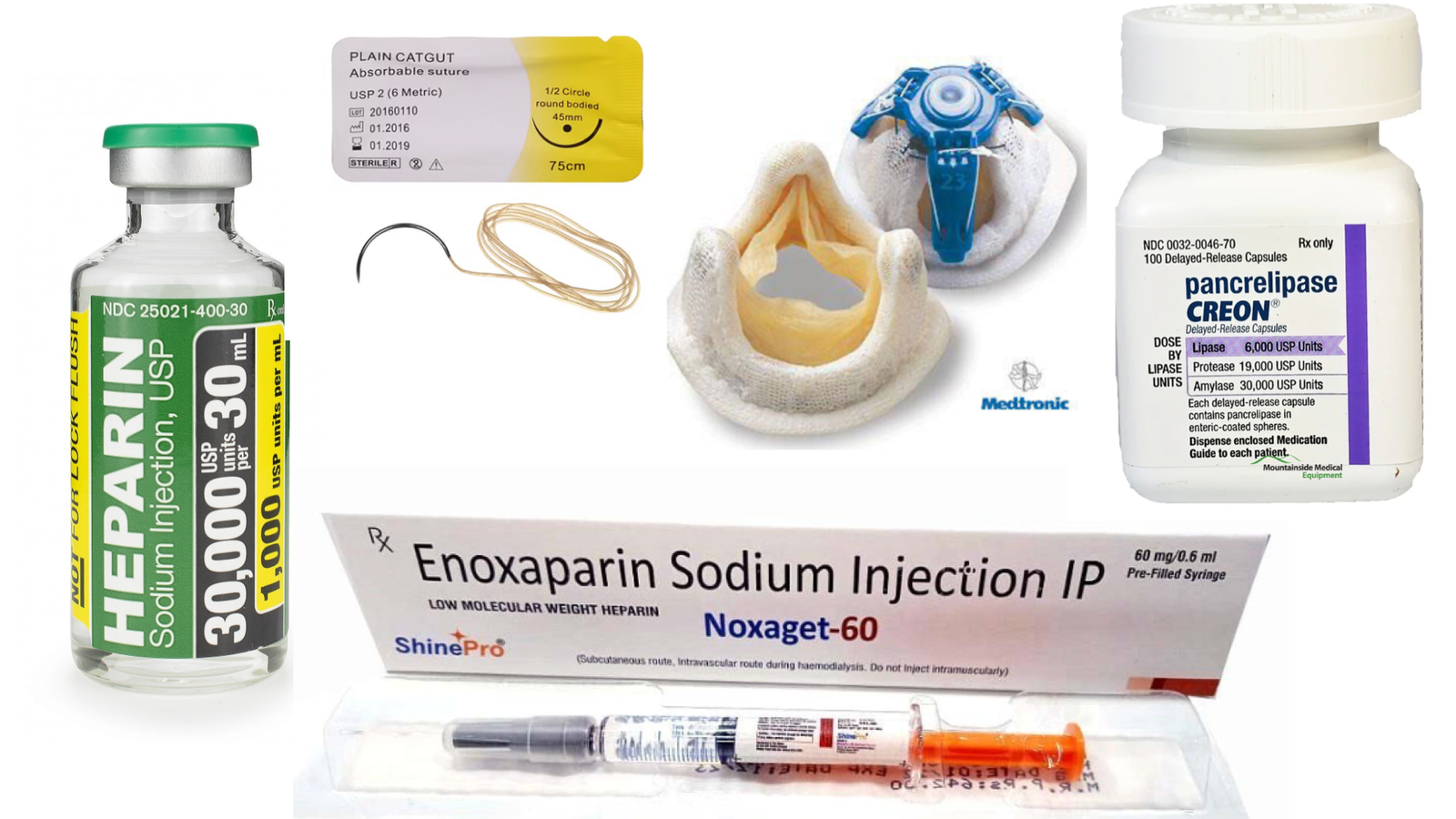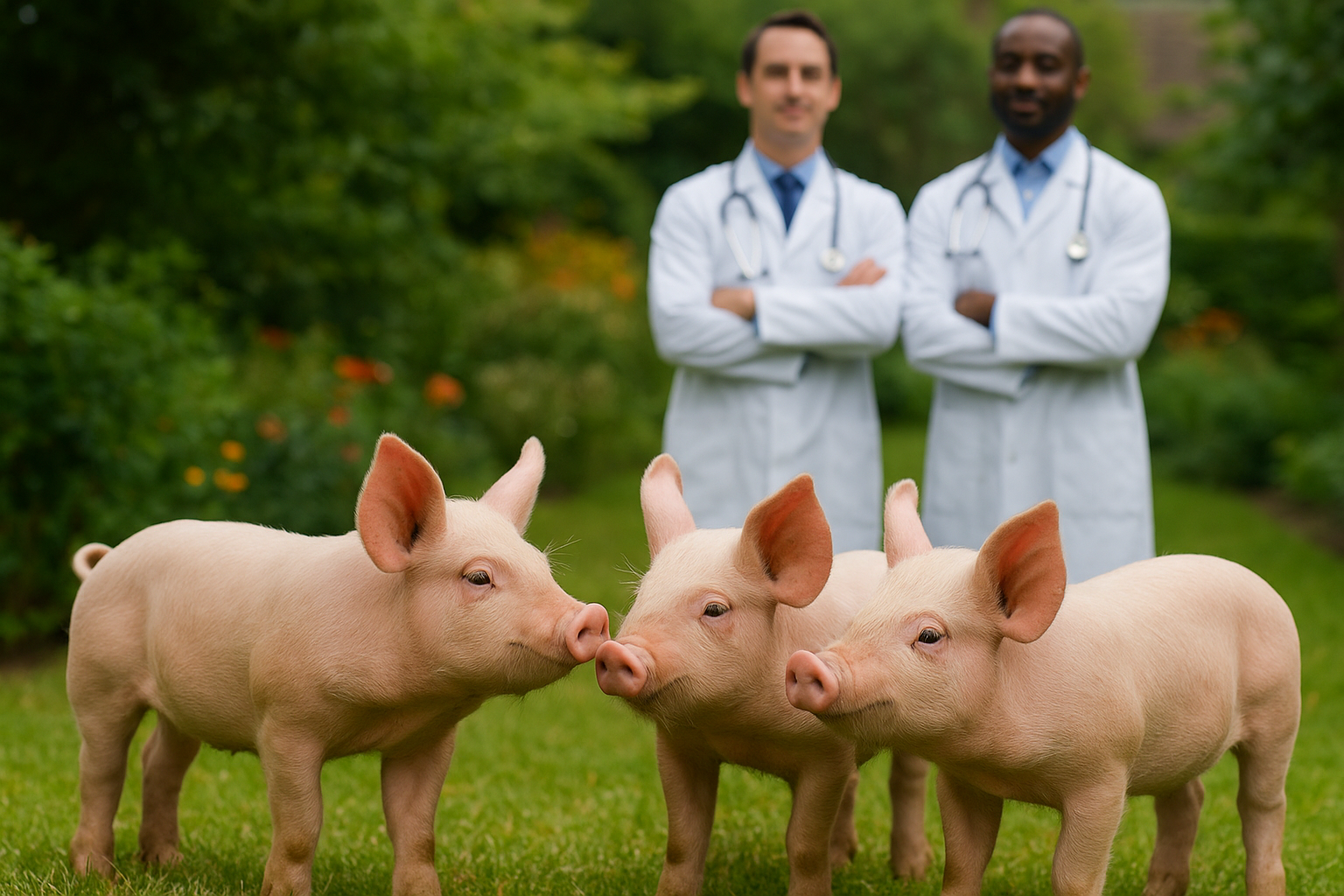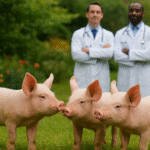Discover how pig/porcine-derived components are used in modern medicine—from heparin to heart valves. A must-read guide for doctors on porcine-based drugs, vaccines, and surgical products, including ethical and religious considerations.
Animal-derived materials, particularly those from pigs/ porcine, play an essential role in many modern medical products. Thanks to their physiological similarities to humans, pigs provide the basis for a wide range of pharmaceuticals, vaccines, surgical materials, and devices. This document summarises key examples relevant to clinicians concerned with product selection, patient counselling, and ethical considerations.

🐖 Porcine-Derived Pharmaceuticals
Many essential drugs are produced using pig tissues and enzymes, which are valued for their biochemical compatibility with humans.
- Heparin and low molecular weight heparins (like enoxaparin): These are anticoagulants used to prevent and treat blood clots, derived primarily from pig intestines.
- Pancreatin (e.g., Creon, Viokace) – Produced from the pig pancreas, it serves as an enzyme replacement for chronic pancreatitis.
- Armour Thyroid – Made from desiccated pig thyroid glands, it is a natural replacement for thyroid hormone.
- Porcine Insulin (historical) – Extracted from pig pancreas, this was formerly used as an insulin source before synthetic options became available.
- Certain hormones beyond insulin, such as ACTH (used for arthritis and inflammatory diseases) and some thyroid hormones, can be extracted from pig glands.
- Stearic acid: A fatty acid sometimes derived from pig fat, used as a lubricant and release agent in tablets.
Synthetic and recombinant alternatives now exist for many of these drugs, but porcine-sourced versions remain common in various parts of the world.
🐖 Vaccines Containing Porcine Components
Some vaccines use gelatin derived from pigs as a stabilizer to maintain vaccine potency during storage and transport.
- Measles, Mumps, Rubella (MMR) – Contains porcine gelatin as a stabilizer.
- Varicella (Chickenpox) – Uses porcine gelatin for stability.
- Shingles (Herpes Zoster) – Includes porcine-derived gelatin.
- Rotavirus – Porcine gelatin is used as a stabilizer for this infant vaccine.
- Influenza (some forms) – Certain flu vaccines also contain porcine gelatin.
Religious authorities in Islam and Judaism may allow the use of these vaccines when medically necessary, due to the high degree of purification involved, but alternative options are preferred when available.
🐖 Porcine-Based Medical Devices and Materials
A variety of devices and biomaterials used in medicine are sourced from pigs, prized for their natural compatibility with human tissue.
- Porcine Heart Valves – A Bioprosthetic valve, used in valve replacement surgeries, made from pig heart tissue. The advantage is its durability, and it doesn’t require lifelong anticoagulation.
- Burn Dressings (Xenografts) – Pig skin is used for temporary grafts in major burn cases.
- Collagen Fillers – Produced from pig collagen, these are used in wound healing, reconstructive, and cosmetic surgery.
- Gelatin Capsules – Oral medications are often delivered in capsules made from pig gelatin.
- Cholederm: A device made from a pig gall bladder that helps heal skin wounds and reduce scarring.
- Porcine Gelatin Sponge (Spongostan): A hemostatic material used to help stop bleeding.
🐖 Porcine-Derived Suture Materials
Catgut sutures are created from the submucosa of pig or sheep intestines. There are two main types:
- Plain Catgut – Rapidly absorbed by tissue.
- Chromic Catgut – Treated to slow down absorption.
These are commonly used for internal soft tissue approximation and ligatures. Some patients may decline these options due to religious or ethical reasons, except in cases where no alternative is available.
Modern synthetic sutures, such as Vicryl, PDS, and Monocryl, offer predictable absorption and are generally preferred for their ethical neutrality and longer shelf life.
Alternatives to Porcine Products
Several non-porcine alternatives are available for patients or professionals seeking options:
- Heparin: Low molecular weight heparin from bovine sources, or synthetic heparinoids
- Thyroid Extract: Synthetic levothyroxine (T4)
- Heart Valves: Mechanical or bovine pericardial valves
- Vaccines: Gelatin-free or recombinant options (limited availability)
- Capsules: Plant-based capsules, such as those made from hydroxypropyl methylcellulose (HPMC)
Ethical, Religious, and Cultural Issues
- Islam: Permits porcine-derived medical products when life-saving and no alternatives are available (subject to local religious rulings).
- Judaism: Allowed under the principle of pikuach nefesh (saving life overrides dietary law).
- Hinduism: Generally has no specific restrictions on pig-derived medical products.
- Vegan/Vegetarian Patients: May request plant-based or synthetic alternatives.
Clinicians should always document informed consent and provide non-porcine alternatives when possible.
Conclusion
Porcine-derived products play a crucial role in numerous medical therapies, devices, and procedures. While their use has advanced patient care, it is essential for healthcare providers to be aware of their origins, remain sensitive to ethical and cultural concerns, and discuss alternatives with patients as appropriate.












Hello my loved one! I want to say that this article
is awesome, great written and include almost all important infos.
I’d like to see extra posts like this .